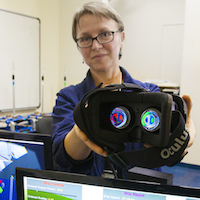
THESIS TOPICS
Amela Sadagic, PhD
Research Associate Professor
Naval Postgraduate School
Computer Science Department
The MOVES Institute
Monterey, CA
home
teaching
research interests
current projects
portfolio
students
thesis topics
work opportunities
publications
resources
private
List of possible Master and PhD student thesis topics
Best practices: my advices for most effective work on your thesis topic

List of possible Master and PhD student thesis topics
- Evaluation of the effectiveness of training in mission rehearsal simulations
- knowledge/skill acquisition, skills and knowledge transfer and retention, special interest: teams and teams-of-teams situations, team metrics, work with domain (expert) users, large and small scale user studies.
- Design of, and experimentation with a new set of tools and systems to support advanced
training and learning methodologies and practices
- more effective learning (learn more & faster, better knowledge and skill acquisition, transfer and retention rate), raise trainees' motivation
- Study of low(er)-tech systems and tools in support of more effective training in simulations
- supplementary use of web logs, podcasts, videocasts, text chat, images, video clips, videoconferencing, in enhancing training using virtual training simulations.
- What is the optimal i.e. most effective combination of learning tools, systems and practices
for particular training objective?
- Take into consideration other dimensions such as individual skills vs team skills, time available for training, range of knowledge and skills to be acquired, skills and knowledge transfer and retention, and motivation.
- What is optimal timing, fragmenting and interweaving of training practices (training in virtual
and real world)?
- What are the optimal time periods that one should dedicate to "virtual" training and to "real" training i.e. training in physical environment, and how many virtual-then-real training sessions should be included?
- What is the maximal time that would be allowed to pass between the two so that skills learned in virtual still transfer successfully to the real world?
- What combination of tools, systems & training practices increases individual and team skills
in assertiveness, decision-making, adaptability, situational awareness and/or communication?
- What set of tools (low-text and high-tech), systems, specially designed training approaches and instructional methodology provides best results in raising situational awareness? Or it helps increase the level of their tactical decision-making skills?
- What combination of tools, systems & training practices has an effect on development of
leadership skills in team(s)?
- What are the parameters/technologies that can enhance this process and its outcomes?
- What is the role of trust in remote collaboration during the training session and what
technologies and approaches can help increase it?
- How does it affect training results?
- Use of physiological measurements in evaluation of virtual training systems
- objective measurement
- Fine tuning of virtual training systems to address negative trends in units/team performance
- resolution, field of view extension of study done by MOVES students: check thesis
- Instrumentation of training facilities - synchronous and asynchronous support of field
training
- combination of VR and computer vision systems
- human systems integration
Best practices: my advices for most effective work on your thesis topic
- Start writing parts (sections) of your thesis sooner rather than later: it is different thought process when you write things down then when you only talk about them. It forces you to be more precise and concise, to clearly define phenomena and outline the problem domain.
- Keep taking notes about different (all) ideas and possible solutions that you come up - you will forget them!
- Talk to your colleagues about your thesis and your research ideas - you will be surprised with the insights that you will get from the people who are not intimately familiar with your work.
- Take part in other people pilot studies. This will help you learn how to design your own studies.
- Join different focus groups (Agents, Human Factors or SAVAGE group) and find a way to have additional exposure to new knowledge and ideas.
- Take part in all discussions - this will help you develop your debating skills that you will ned for your classes but also later on in your professional career.
- Write papers and articles based on the results you get while working on your thesis - now is the optimal time to do it, and it is highly unlikely one will have time for that after you leave university. While at the university you also have advantage of being supported by your professors and colleagues in that process.
